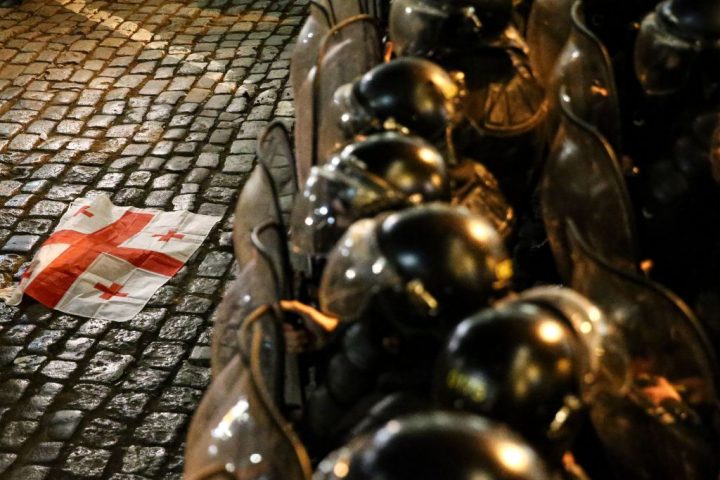Thousands of protesters have taken to the streets of Georgia’s capital Tbilisi for a second day. Riot police have used tear gas, stun grenades and water cannons to control the crowds; protestors responded by throwing stones, flares and in some cases even Molotov cocktails. A group of those demonstrating even tried to break into the parliamentary building. Over sixty arrests have been made so far.
The focus of demonstrators’ anger is legislation to create a ‘foreign agents’ register. People’s Power (PP), the populist party which introduced the legislation, claim it will encourage ‘transparency over foreign influence’ in Georgia. But critics fear a crackdown on freedom of speech and criticism of the government – and claim the bills are a copy of repressive legislation used in Russia to target dissidents.
For Georgians these bills are also about whether the time has finally come for Georgia to break ties with Russia
Protestors say the proposed legislation presents a threat to Georgia’s democracy. They have branded it a ‘Russian-style law’ that would significantly restrict the country’s freedoms. Russia’s own ‘foreign agents’ legislation was passed in 2012, quickly expanding over the ensuing decade to incorporate just about anyone dissenting against the state. Many media outlets, journalists and critics of the Kremlin have been declared ‘foreign agents’, with a notable surge shortly before and in the aftermath of Putin’s invasion of Ukraine. As a result, many felt compelled to flee into exile for fear of punishment at the hands of the Kremlin. Last summer, Russia’s government proposed to expand the law even further to remove the need of tangible foreign links – just a vague suspicion would be enough to condemn someone as a ‘foreign agent’.
Is Georgia heading in a similar direction? The proposed legislation would certainly hand extensive power to the government. The first bill, ‘On Transparency of Foreign Influence’ and dubbed the ‘Georgian version’, would require any non-commercial legal entities, including NGOs and media outlets, to register as ‘foreign agents’ if more than 20 per cent of their funding comes from abroad. Any organisations listed as foreign agents would be subject to ‘monitoring’ by the state. The second bill, ‘On Registration of Foreign Agents’ and known as the ‘American version’ due to PP’s claim that the bill is an almost exact copy of the US’s Foreign Agent Registration Act, goes further. It includes measures that would require any individual or legal entity receiving foreign funding to register as foreign agents, no matter the amount of money involved.
But despite the backlash, Georgia’s parliament does not appear to be listening: yesterday, the first reading of the Georgian version was voted through by a margin of 76 to 13.
The anger in Georgia at these two proposed bills speaks to a broader internal conflict in the country between those who want to move closer to Europe and those who want Georgia to retain loyalty to Moscow. Georgia applied to join the EU at the same time as Ukraine in the wake of Putin’s invasion last year. Georgia’s pro-EU contingent fears that were these proposals to become law, Georgia’s prospects of joining the EU would be significantly damaged.
The division caused by this legislation clearly runs deep: Georgia’s president Salome Zourabichvili, elected directly by the people, yesterday expressed solidarity with the protestors and vowed to veto the bills. They should, she said ‘be recalled [from parliament]’. They have also received international condemnation from the EU and US, as well as from human rights organisations such as Human Rights Watch.
A first reading for the American version of the bill is scheduled for tomorrow. Georgia’s leading opposition party, the liberal pro-western United National Movement, has called for the protests to continue until the bills are dropped. Chants of ‘No to Russian law’ and ‘You are Russian’ are ringing through the air aimed at the politicians wanting to push the legislation through. Whether they succeed or not remains to be seen. But as these chants show, for Georgians these bills are also about something bigger: whether the time has finally come for Georgia to break ties with Russia.







Comments